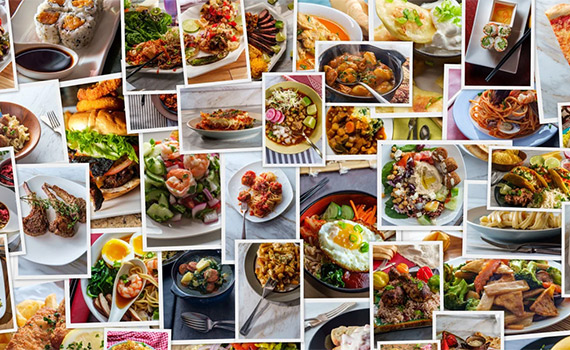The Mediterranean diet is based on the traditional eating patterns of countries around the Mediterranean Sea and is widely regarded as one of the most effective models for healthy eating. This diet emphasizes a well-balanced intake of nourishing foods, such as fresh vegetables and fruits, whole grains, legumes, olive oil, fish, and nuts. At the same time, it allows for only minimal consumption of red meat and processed foods.
In response to the question "What is the Mediterranean diet?" it can be said that this approach not only aims for weight loss but also works to prevent chronic illnesses, such as heart and vascular diseases, diabetes, and certain types of cancer. In addition to nutrition, social dining practices and regular physical activity are also key elements of the Mediterranean diet.
How to Follow the Mediterranean Diet

Mediterranean-style eating particularly emphasizes olive oil, fresh fruits and vegetables, whole grains, fish, and legumes. So, what is the Mediterranean diet, and how is it followed? Here is a step-by-step guide to implementing the Mediterranean way of eating:
-
Choose Healthy Fats: Olive oil is the primary fat source in Mediterranean-style eating. Olive oil is used in meals and salads instead of saturated fats like butter.
-
Fresh, Seasonal Vegetables and Fruits: Consuming plenty of fresh vegetables and fruits with each meal is a cornerstone of this diet. Prioritizing seasonal produce is also recommended.
-
Opt for Whole Grains: Replace white bread and rice with whole grains such as whole wheat bread, bulgur, and quinoa. These foods aid in regulating digestion and help you feel satisfied for a longer period.
-
Focus on Fish and Seafood: Eating fish and seafood at least 2–3 times a week provides a beneficial source of omega-3 fatty acids.
-
Include Legumes and Nuts: Protein needs are met with legumes (like chickpeas and lentils) and nuts, such as almonds and walnuts.
-
Limit Red Meat and Processed Foods: Red meat is consumed in limited amounts, while poultry like chicken and turkey is preferred. Avoiding processed foods and sugars is one of the key rules of this dietary model.
-
Consume Dairy Products Sparingly: Dairy products, like yogurt and cheese, are consumed frequently, but portion control is essential.
-
Make Physical Activity a Routine: Mediterranean-style eating isn’t just about dietary habits. Regular physical activity is also an integral part of this lifestyle.
In response to "What is the Mediterranean diet, and how is it followed?" the answer involves adopting a lifestyle that combines a balanced, plant-focused diet with regular movement. This diet is recognized as an effective approach to promoting heart health and lowering the risk of chronic diseases.
It’s essential to remember one important point. Before adopting any dietary model, it's best to consult a nutrition and dietetics professional to determine if this dietary type suits you based on expert guidance.
What Are the Basic Principles of the Mediterranean Diet?

The Mediterranean diet embraces an approach that includes both balanced nutrition and social and physical activities as part of a healthy lifestyle. In line with healthy eating recommendations, it encourages a plant-based diet. Consuming plenty of vegetables, fruits, and legumes at each meal is a priority. Plant-based foods provide fiber, which supports the digestive system, while offering antioxidants that strengthen immunity.
Mediterranean Diet Rules

The Mediterranean Diet advocates for a program that is very helpful in living a healthy and balanced life. This diet is characterized by abundant consumption of fresh vegetables and fruits, main utilization of olive oil as fat, and whole grains. Fish and seafood are consumed 2–3 times a week, with red meat rarely consumed. Poultry and legumes provide substantial amounts of protein to this diet.
Foods to Avoid on the Mediterranean Diet

In the Mediterranean dietary model, certain foods should be limited to promote a healthy lifestyle. According to healthy eating guidelines, sugary drinks, packaged, and processed foods should be eliminated. Sweets and snacks containing refined sugar do not align with the balanced eating principles recommended by this diet.
What Are the Core Food Groups of the Diet?

The Mediterranean diet consists of balanced and varied food groups that support a healthy lifestyle. This model emphasizes healthy and natural foods in daily meals. Within the framework of a healthy eating program, plant-based foods are prioritized at every meal.
Breakfasts often include foods like olives, whole-grain bread, cheese, and seasonal fruits. Lunch and dinner frequently feature vegetable dishes prepared with olive oil. Salads, legumes, and grilled vegetables enrich main meals, while whole-grain pasta and bulgur are incorporated into meals. Fish and seafood are among the dishes recommended to be consumed several times a week.
In the Mediterranean diet, red meat consumption is limited, with white meat, legumes, and nuts preferred for protein needs. Fresh fruits satisfy sweet cravings instead of processed sugars. Staying hydrated by drinking water throughout the day, opting for snacks based on fruits and vegetables, and maintaining healthy eating habits contribute to the sustainability of this diet.
Which Food Groups Are Prominent?

The Mediterranean diet encourages plant-based and balanced eating. Fresh vegetables, fruits, legumes, and whole grains take center stage in this diet. Olive oil is used as the primary fat source, while healthy protein sources include fish, seafood, and poultry. Nuts and seeds are added to meals to provide beneficial fats.
Who Is the Mediterranean Diet Suitable For?

The Mediterranean diet is a model that suits many individuals aiming to adopt a healthy lifestyle. It may be particularly beneficial for those at risk of heart and vascular diseases, diabetes, and obesity. It is also ideal for those looking to maintain weight control or develop balanced eating habits.
It’s essential to highlight the importance of consulting a specialist before changing your diet. Especially for individuals with chronic illnesses or those who are pregnant, personalized nutrition plans may be required. The Mediterranean diet, known for its balanced and sustainable framework, provides a dependable approach to healthier eating.




















